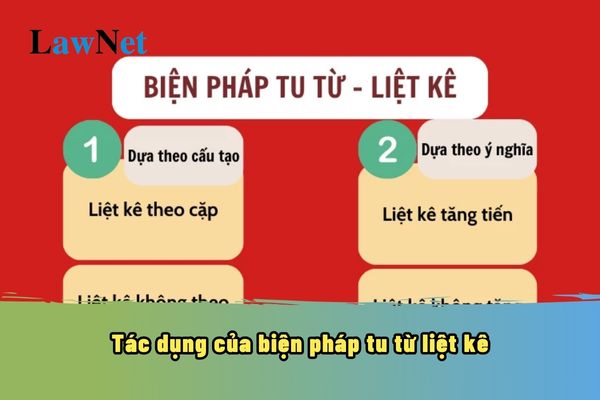What are the effects of the rhetorical device of enumeration and examples thereof? What rhetorical devices will primary school students in Vietnam learn?
What are the effects of the rhetorical device of enumeration and examples thereof?
Students can refer to the following information on the effects of the rhetorical device of enumeration and examples thereof:
|
What are the effects of the rhetorical device of enumeration and examples thereof? The rhetorical device of enumeration is an effective tool in making a text more vibrant, engaging, and expressive. When using enumeration, the writer arranges successively many words, phrases, or sentences of the same type to emphasize or clarify a particular idea or image. |
*Note: The information is for reference only./.

What are the effects of the rhetorical device of enumeration and examples thereof? (Image from the Internet)
What rhetorical devices will primary school students in Vietnam learn?
Under Clause 2, Section 4 of the General Education Program in Literature issued with Circular 32/2018/TT-BGDDT:
Required Outcomes of Specific Competencies
2.1. Required Outcomes at the primary Level
a) Linguistic Competence
...
b) Literary Competence
...
For students in grades 3, 4, and 5: know how to read expressively literary texts; retell and summarize the main content of stories and poems; comment on characters, events, and the attitudes and emotions of the author in the text; identify the time and place, various poetic meter types, beautiful and unique words, images, and the effects of personification and simile rhetorical devices. Understand the meaning or lesson drawn from the text. Be able to write paragraphs, stories, and descriptive essays expressing feelings and imagination.
...
The rhetorical devices that primary school students in Vietnam will learn include personification and simile.
Additionally, at the lower secondary level, under Clause 2, Section 4 of the General Education Program in Literature issued with Circular 32/2018/TT-BGDDT, lower secondary students are taught to recognize and analyze rhetorical devices as follows:
In grade 6 and grade 7: recognize and analyze the effects of several formal elements and artistic devices associated with the characteristics of each literary genre, including rhetorical devices such as metaphor, metonymy, hyperbole, and euphemism.
In grades 8 and 9: recognize and analyze the effects of several formal elements and artistic devices in each literary genre, including rhetorical devices like repetition, wordplay, irony, and paradox.
What are the duties of primary school students in Vietnam?
According to Article 34 of the Primary School Charter issued with Circular 28/2020/TT-BGDDT, the duties of primary school students are as follows:
- Study and train according to the school's educational plan and regulations; have a conscious attitude towards self-learning and training to comprehensively develop qualities and competencies following the objectives of the primary school education program.
- Fully and effectively perform learning tasks; know how to self-study under the guidance of teachers; actively and positively participate in experiential activities, applying learned knowledge to real-life situations; exercise and maintain personal hygiene.
- Be filial to parents and grandparents; respect and be polite to teachers and elders; show solidarity, love, and assistance to friends, younger siblings, the elderly, people with disabilities, and those in difficult circumstances.
- Comply with regulations, protect school and public property; obey traffic safety regulations; maintain hygiene and protect the environment.
- Contribute to activities that build, protect, and promote the traditions of the school and local community.

